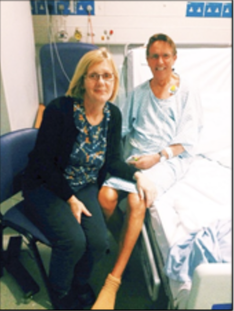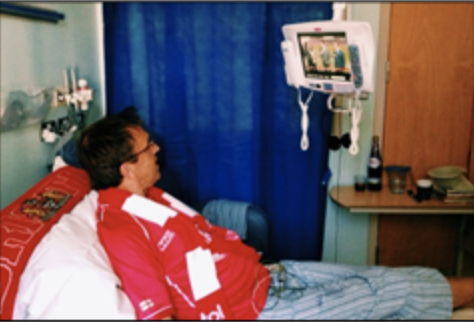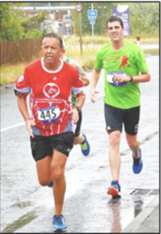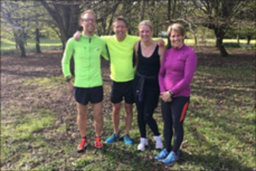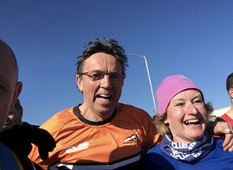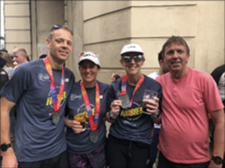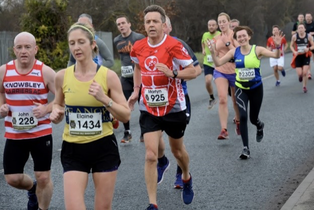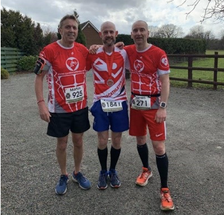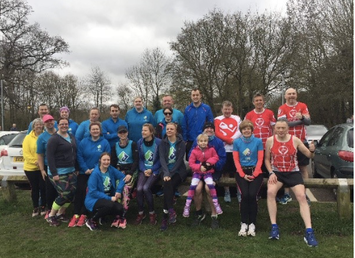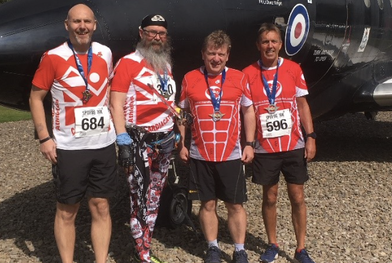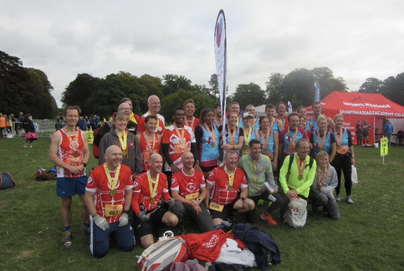Martyn Bidgood - Cardiac Athletes book
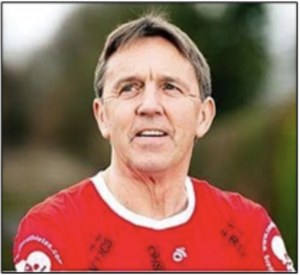
Wrekin Road Runners member Martyn wrote a chapter for 'Cardiac Athletes book', he has kindly allowed us to share his story, for us to share with you.
CARDIAC ATHLETE - Chapter 15
First name: Martyn
Country: England
Diagnosis: heart attack, syncope, VF Cardiac Arrest,
Treatment: CPR, defib, angiogram, PTCA & 2 x stents. ICD.
Retirement! Now, finally, the chance to relax, to spend time with my family, to explore the world and to put in the training required to run a Marathon again. Things didn’t quite work out that way!
Running really only happened to me when I reached my fifties. I have enjoyed playing sport all my life, especially football and tennis, but when the aches and bruises started telling me that I could no longer compete at the same level as all the ‘youngsters’ I had to find another way to keep active. There was no way I was going to sit around doing nothing.
In September 2003 my father-in-law died. Early in 2004 I saw that the Great North Run was taking place at the end of September, just over a year after my father-in-law’s death. Wanting to achieve something positive following his death I suggested to my daughter, who is a PE teacher, that we should enter the Run and raise funds for Cancer Research UK.
In the following months I began to do some quite haphazard training runs and felt confident about completing the Half Marathon distance.
What a great run to do as my first organised race! The anticipation standing among thousands of others at the start on a Motorway in the middle of Newcastle, the Red Arrows soaring above our heads over the Tyne Bridge, the bands playing at seemingly every roundabout on the route, the crowds cheering and offering sweets, drinks, fruit and even cans of beer and then the atmosphere along the final mile to the finish along the sea front at South Shields. I loved it and remembered the feeling of disappointment when we hit the 8 mile mark that there would now be only 5 more miles left to run.
Following the excitement and the adrenalin rush it was soon back to normality – work the next day! But, after a few days where I seemed to spend quite a few times visiting the pub, I suddenly realised that, despite a lifetime of playing sport, this was the fittest I had ever been and it would be wasteful to let this go. I had been bitten by the running bug.
In the following years I completed a number of half marathons and other races and in April 2006 ran my only full marathon, London. Another great occasion, this time raising funds for a local charity, the Severn Hospice. I quickly appreciated that in order to run a successful Marathon a great deal of dedication to training is essential and vowed that, when I had the time to train properly, I would run another Marathon.
Following my retirement in September 2014 a clear plan began to form in my head. By this time my son and my eldest daughter had already run the London Marathon, so wouldn’t it be great to run the London Marathon with them? Although probably some distance behind!
In order to ensure a place in London I would need to achieve a good for age qualification and decided the Manchester Marathon in 2015 would be a good place to attempt this. We could all then apply to enter the 2016 London Marathon.
My son, Richard, devised my training programme and the serious work began. I could now run regularly at a time of my choosing and I began feeling stronger and more confident over longer distances. Not long now until 17th April, I was confident I could achieve the age qualification time of 3 hours 45 minutes!
On 1st March I completed the Anglesey Half Marathon in just over 1 hour 38 minutes. The following week I managed my longest long run of 20 miles and the week after that another long run of 18+ miles. Things were going well. We spent a long weekend in Llandudno and on the morning of the day we were travelling home I ran a lovely shorter run of just over 8 miles around the Great Orme. I felt good!
Unfortunately, my wife was not feeling well and had been suffering for a few weeks with quite a bad chest infection so when we arrived home I made her sit down with a coffee while I unloaded the car. She then went out and I sat down with a drink and began to watch television. I fell asleep and when I woke up I felt dizzy, quite disorientated and in need of fresh air. I tried to go for a short walk but still felt quite dizzy so returned home.
When my wife returned home she suggested I should go to bed and try to get some sleep. During the evening she kept checking in on me and could see I was getting no better; I was grey in the face and sweating. On contacting the out of hours doctor (SHROPDOC), she was advised to bring me to SHROPDOC at the Princess Royal Hospital. At this time I was quite confused and even delusional and told the doctor I had been to the hospital the previous weekend because I hadn’t been well. Of course, I hadn’t been, but I had a clear picture in my head of walking through a door into a hospital ward.
Following a few tests it was decided I should remain at the hospital for monitoring and early in the morning I was taken to the cardiac ward. Apparently, levels of the chemical troponin had been found in my blood and this is an indicator of a possible heart attack.
I felt fine all day in the ward, even if I was constantly interrupted by my monitor going off; it was set to send an alert when my heart beat dropped below 50bpm. My resting heart rate was normally regularly well below 40bpm so the nurses decided to set the alarm to go at a much lower rate.
Following a visit from my wife in the evening I made a telephone call to my son to assure him I was fine and that I would probably be going home the following morning. As I had had an interrupted night’s sleep the previous evening I decided to have an early night and at ten minutes to ten shut my eyes and quickly drifted off into sleep.
First name: Martyn
Country: England
Diagnosis: heart attack, syncope, VF Cardiac Arrest,
Treatment: CPR, defib, angiogram, PTCA & 2 x stents. ICD.
Retirement! Now, finally, the chance to relax, to spend time with my family, to explore the world and to put in the training required to run a Marathon again. Things didn’t quite work out that way!
Running really only happened to me when I reached my fifties. I have enjoyed playing sport all my life, especially football and tennis, but when the aches and bruises started telling me that I could no longer compete at the same level as all the ‘youngsters’ I had to find another way to keep active. There was no way I was going to sit around doing nothing.
In September 2003 my father-in-law died. Early in 2004 I saw that the Great North Run was taking place at the end of September, just over a year after my father-in-law’s death. Wanting to achieve something positive following his death I suggested to my daughter, who is a PE teacher, that we should enter the Run and raise funds for Cancer Research UK.
In the following months I began to do some quite haphazard training runs and felt confident about completing the Half Marathon distance.
What a great run to do as my first organised race! The anticipation standing among thousands of others at the start on a Motorway in the middle of Newcastle, the Red Arrows soaring above our heads over the Tyne Bridge, the bands playing at seemingly every roundabout on the route, the crowds cheering and offering sweets, drinks, fruit and even cans of beer and then the atmosphere along the final mile to the finish along the sea front at South Shields. I loved it and remembered the feeling of disappointment when we hit the 8 mile mark that there would now be only 5 more miles left to run.
Following the excitement and the adrenalin rush it was soon back to normality – work the next day! But, after a few days where I seemed to spend quite a few times visiting the pub, I suddenly realised that, despite a lifetime of playing sport, this was the fittest I had ever been and it would be wasteful to let this go. I had been bitten by the running bug.
In the following years I completed a number of half marathons and other races and in April 2006 ran my only full marathon, London. Another great occasion, this time raising funds for a local charity, the Severn Hospice. I quickly appreciated that in order to run a successful Marathon a great deal of dedication to training is essential and vowed that, when I had the time to train properly, I would run another Marathon.
Following my retirement in September 2014 a clear plan began to form in my head. By this time my son and my eldest daughter had already run the London Marathon, so wouldn’t it be great to run the London Marathon with them? Although probably some distance behind!
In order to ensure a place in London I would need to achieve a good for age qualification and decided the Manchester Marathon in 2015 would be a good place to attempt this. We could all then apply to enter the 2016 London Marathon.
My son, Richard, devised my training programme and the serious work began. I could now run regularly at a time of my choosing and I began feeling stronger and more confident over longer distances. Not long now until 17th April, I was confident I could achieve the age qualification time of 3 hours 45 minutes!
On 1st March I completed the Anglesey Half Marathon in just over 1 hour 38 minutes. The following week I managed my longest long run of 20 miles and the week after that another long run of 18+ miles. Things were going well. We spent a long weekend in Llandudno and on the morning of the day we were travelling home I ran a lovely shorter run of just over 8 miles around the Great Orme. I felt good!
Unfortunately, my wife was not feeling well and had been suffering for a few weeks with quite a bad chest infection so when we arrived home I made her sit down with a coffee while I unloaded the car. She then went out and I sat down with a drink and began to watch television. I fell asleep and when I woke up I felt dizzy, quite disorientated and in need of fresh air. I tried to go for a short walk but still felt quite dizzy so returned home.
When my wife returned home she suggested I should go to bed and try to get some sleep. During the evening she kept checking in on me and could see I was getting no better; I was grey in the face and sweating. On contacting the out of hours doctor (SHROPDOC), she was advised to bring me to SHROPDOC at the Princess Royal Hospital. At this time I was quite confused and even delusional and told the doctor I had been to the hospital the previous weekend because I hadn’t been well. Of course, I hadn’t been, but I had a clear picture in my head of walking through a door into a hospital ward.
Following a few tests it was decided I should remain at the hospital for monitoring and early in the morning I was taken to the cardiac ward. Apparently, levels of the chemical troponin had been found in my blood and this is an indicator of a possible heart attack.
I felt fine all day in the ward, even if I was constantly interrupted by my monitor going off; it was set to send an alert when my heart beat dropped below 50bpm. My resting heart rate was normally regularly well below 40bpm so the nurses decided to set the alarm to go at a much lower rate.
Following a visit from my wife in the evening I made a telephone call to my son to assure him I was fine and that I would probably be going home the following morning. As I had had an interrupted night’s sleep the previous evening I decided to have an early night and at ten minutes to ten shut my eyes and quickly drifted off into sleep.
The next thing I was aware of was opening my eyes and wondering why six people were standing over my bed staring down at me. I wiped my hand across my mouth and found a large piece of plastic, an oxygen mask, in the way. I had no idea what had happened. The staff explained to me that I had gone into cardiac arrest and that they had given me CPR and had used a defibrillator to stimulate my heart into beating again. I have no recollection of any of this and because there were no marks or bruises I could not really believe that it had happened.
The cardiologist arrived around midnight and tried to explain what had happened, but even he wasn’t sure why this had happened to someone as fit as I apparently was. He informed me I would have an angiogram but was convinced this wouldn’t show anything. When asked questions about the major factors that cause heart disease I was always giving negative answers; do you smoke? NO; do you have high levels of cholesterol? NO; do you suffer with high blood pressure? NO; are you physically inactive? NO; are you obese? NO; do you have a family history of heart disease? NO; is your diet poor? NO; do you have diabetes? NO; do you suffer with stress? I had been stressed during my working life, but now I was six months into my retirement.
It was a bit of a surprise the next day, therefore, when the angiogram revealed that two arteries were 90% blocked. Confused by all this it was decided that I should be transferred to the Queen Elizabeth Hospital in Birmingham for further investigation. It was here that I had two stents inserted.
In the meantime, it had dawned on me that, as well as not running the Manchester Marathon, I would also not be making my planned trip to Wembley on Sunday 22nd March to see my team, Bristol City, play in the final of the Johnstone Paints Trophy. I was in possession of nine tickets and had arranged the travel for a group of City fans who live in Shropshire. We arranged for my friends to pick up the tickets from my wife on the Sunday morning and I had to settle for hiring a TV to watch the game from my hospital bed. I did warn the staff that if their monitors picked up an increase in my heart rate, it would probably be because a goal had been scored.
As the game started I was informed a bed had become available in Birmingham and I would be taken there by ambulance later that afternoon. Thankfully, the ambulance did not arrive until after the game had finished and thankfully, City won.
The cardiologist arrived around midnight and tried to explain what had happened, but even he wasn’t sure why this had happened to someone as fit as I apparently was. He informed me I would have an angiogram but was convinced this wouldn’t show anything. When asked questions about the major factors that cause heart disease I was always giving negative answers; do you smoke? NO; do you have high levels of cholesterol? NO; do you suffer with high blood pressure? NO; are you physically inactive? NO; are you obese? NO; do you have a family history of heart disease? NO; is your diet poor? NO; do you have diabetes? NO; do you suffer with stress? I had been stressed during my working life, but now I was six months into my retirement.
It was a bit of a surprise the next day, therefore, when the angiogram revealed that two arteries were 90% blocked. Confused by all this it was decided that I should be transferred to the Queen Elizabeth Hospital in Birmingham for further investigation. It was here that I had two stents inserted.
In the meantime, it had dawned on me that, as well as not running the Manchester Marathon, I would also not be making my planned trip to Wembley on Sunday 22nd March to see my team, Bristol City, play in the final of the Johnstone Paints Trophy. I was in possession of nine tickets and had arranged the travel for a group of City fans who live in Shropshire. We arranged for my friends to pick up the tickets from my wife on the Sunday morning and I had to settle for hiring a TV to watch the game from my hospital bed. I did warn the staff that if their monitors picked up an increase in my heart rate, it would probably be because a goal had been scored.
As the game started I was informed a bed had become available in Birmingham and I would be taken there by ambulance later that afternoon. Thankfully, the ambulance did not arrive until after the game had finished and thankfully, City won.
On my release from Birmingham I was given a copy of the discharge letter that was sent to my GP. It clearly stated:
“While on CCU at Telford, he had a syncopal episode with a VF arrest which required 30 seconds of CPR followed by a shock with ROSC.”
It was only at this point that I realised the staff at the Princess Royal Hospital had, indeed, performed those actions that have saved my life. How can I ever thank them enough? The medic who travelled in the back of the ambulance with me from Telford to Birmingham had told me that I had been very lucky. If the cardiac arrest had happened anywhere else I probably would not have survived, and, as had happened on one of their calls that morning, I would have died before the ambulance reached me.
Similarly, I had no idea of the suffering and worry this incident had caused for my family. At no point was I ever in pain, or even feeling ill. I felt as if I would be able to come home from the hospital and soon be able to carry on with life as normal.
On the evening of my release from hospital my wife was going to her monthly book club and I insisted she should still do this. On the way home she said that my daughter would be coming around in the evening to look after me. I was most indignant that I did not need to be ‘mollycoddled’ and told them I didn’t want them to spend all their time fussing about me. I now realise, of course, that the whole incident was much more worrying for them and they needed to know that I would be safe.
On my release from hospital, the consultant was still unsure of the reason for the event, but he had said that I should refrain from running any more marathons. A week later, I received a call from the hospital to say that, following a meeting of all the doctors and consultants, they wanted to continue monitoring me from Birmingham, and I should return in six months time for another MRI scan. It appears they were considering the possibility that I had hypertrophic cardiomyopathy.
I had no intention of sitting around waiting for my next heart attack or cardiac arrest to happen and, without overexerting myself, was keen to potter around in the garden. As I was quite comfortable doing this, on 15th April I ventured onto a treadmill and was able to run two miles in less than twenty minutes. When I began a course of cardiac rehabilitation and physiotherapy I was told I had probably pushed myself too far, too soon so at the end of the month I had a break from treadmill running and stuck to the walking I had been encouraged to do during the rehab sessions.
I began running outside again in early June and after a few months felt confident enough to do a Park Run. My daughter agreed to run with me and we agreed it would be a gentle, steady run. I felt quite comfortable, although I couldn’t resist the temptation of trying to keep up with runners who I knew I would normally be ahead of. A 5k in 24:50 wasn’t bad for someone who had died four months previously.
Since my comeback I have tried to run as frequently as possible. Doctors initially advised me to run at a comfortable pace, i.e. so that I could hold a conversation while running. Knowing that if I was running on my own I would probably push myself too much too quickly, I decided to join a running club, Wrekin Road Runners, so that I could run with a slower group. Running with a group of fellow runners also gave me greater confidence and I was soon able to increase my weekly mileage. I also joined an online support group, Cardiac Athletes, where I have been given great support by others around the world who have had similar experiences. It was great to be part of the UK meet up for Cardiac Athletes in Thoresby in October 2017 and also to be able to meet up with other local Cardiac Athletes at the Kingsbury Park Run in December.
Apart from a few breaks I have been able to maintain a regular routine. In April 2016 I had my ICD fitted and, although this was carried out under local anaesthetic, the procedure took a lot more out of me than I expected and I was unable to run for a month.
Later in the same year, in December, I also managed to break my fifth metatarsal while out running and was unable to run for seven weeks. On both occasions I very quickly put on weight and also my whole demeanour and attitude changed. I realised how much I needed my running.
Throughout my recovery I have tried to gradually push myself a little more and to improve my times, although I realise I will never achieve the times I was capable of before my heart attack. This can sometimes be frustrating, but I keep reminding myself that I am fortunate to be able to run at all.
Currently, I have managed to lower my best 5K time to 22:23 and my 10K time to 46:25. Following an unsuccessful attempt to run the Shifnal Half Marathon in June 2017, when I had to stop after seven miles because I was feeling unwell, I finally achieved the goal of running another half marathon at the Conwy Half Marathon in November 2017. Two years and eight months previously this was something I thought I would never be able to do again, so I was quite emotional when I crossed the finish line. I kept telling myself that the time was unimportant as finishing the race was a tremendous achievement, but I must admit that, although nine minutes slower than my last half marathon time, I was quietly pleased to still be able to complete the Half Marathon distance in under 1 hour 50 minutes (1hr 47mins 23secs). Since then, I have completed a further four Half Marathons and achieved a time of 1hr 43mins 49 secs at Droitwich in April. I will probably now be unable to attempt another Marathon, but at the finish of the Conwy Half Marathon I began to think that that was, perhaps, not such a bad thing. However, I was able to cross the finishing line of the April 2018 Manchester Marathon running the fourth leg of the relay for a team from my club, Wrekin Road Runners.In April 2019 I will be part of a Cardiac Athletes Relay Team running in the Manchester Marathon.
“While on CCU at Telford, he had a syncopal episode with a VF arrest which required 30 seconds of CPR followed by a shock with ROSC.”
It was only at this point that I realised the staff at the Princess Royal Hospital had, indeed, performed those actions that have saved my life. How can I ever thank them enough? The medic who travelled in the back of the ambulance with me from Telford to Birmingham had told me that I had been very lucky. If the cardiac arrest had happened anywhere else I probably would not have survived, and, as had happened on one of their calls that morning, I would have died before the ambulance reached me.
Similarly, I had no idea of the suffering and worry this incident had caused for my family. At no point was I ever in pain, or even feeling ill. I felt as if I would be able to come home from the hospital and soon be able to carry on with life as normal.
On the evening of my release from hospital my wife was going to her monthly book club and I insisted she should still do this. On the way home she said that my daughter would be coming around in the evening to look after me. I was most indignant that I did not need to be ‘mollycoddled’ and told them I didn’t want them to spend all their time fussing about me. I now realise, of course, that the whole incident was much more worrying for them and they needed to know that I would be safe.
On my release from hospital, the consultant was still unsure of the reason for the event, but he had said that I should refrain from running any more marathons. A week later, I received a call from the hospital to say that, following a meeting of all the doctors and consultants, they wanted to continue monitoring me from Birmingham, and I should return in six months time for another MRI scan. It appears they were considering the possibility that I had hypertrophic cardiomyopathy.
I had no intention of sitting around waiting for my next heart attack or cardiac arrest to happen and, without overexerting myself, was keen to potter around in the garden. As I was quite comfortable doing this, on 15th April I ventured onto a treadmill and was able to run two miles in less than twenty minutes. When I began a course of cardiac rehabilitation and physiotherapy I was told I had probably pushed myself too far, too soon so at the end of the month I had a break from treadmill running and stuck to the walking I had been encouraged to do during the rehab sessions.
I began running outside again in early June and after a few months felt confident enough to do a Park Run. My daughter agreed to run with me and we agreed it would be a gentle, steady run. I felt quite comfortable, although I couldn’t resist the temptation of trying to keep up with runners who I knew I would normally be ahead of. A 5k in 24:50 wasn’t bad for someone who had died four months previously.
Since my comeback I have tried to run as frequently as possible. Doctors initially advised me to run at a comfortable pace, i.e. so that I could hold a conversation while running. Knowing that if I was running on my own I would probably push myself too much too quickly, I decided to join a running club, Wrekin Road Runners, so that I could run with a slower group. Running with a group of fellow runners also gave me greater confidence and I was soon able to increase my weekly mileage. I also joined an online support group, Cardiac Athletes, where I have been given great support by others around the world who have had similar experiences. It was great to be part of the UK meet up for Cardiac Athletes in Thoresby in October 2017 and also to be able to meet up with other local Cardiac Athletes at the Kingsbury Park Run in December.
Apart from a few breaks I have been able to maintain a regular routine. In April 2016 I had my ICD fitted and, although this was carried out under local anaesthetic, the procedure took a lot more out of me than I expected and I was unable to run for a month.
Later in the same year, in December, I also managed to break my fifth metatarsal while out running and was unable to run for seven weeks. On both occasions I very quickly put on weight and also my whole demeanour and attitude changed. I realised how much I needed my running.
Throughout my recovery I have tried to gradually push myself a little more and to improve my times, although I realise I will never achieve the times I was capable of before my heart attack. This can sometimes be frustrating, but I keep reminding myself that I am fortunate to be able to run at all.
Currently, I have managed to lower my best 5K time to 22:23 and my 10K time to 46:25. Following an unsuccessful attempt to run the Shifnal Half Marathon in June 2017, when I had to stop after seven miles because I was feeling unwell, I finally achieved the goal of running another half marathon at the Conwy Half Marathon in November 2017. Two years and eight months previously this was something I thought I would never be able to do again, so I was quite emotional when I crossed the finish line. I kept telling myself that the time was unimportant as finishing the race was a tremendous achievement, but I must admit that, although nine minutes slower than my last half marathon time, I was quietly pleased to still be able to complete the Half Marathon distance in under 1 hour 50 minutes (1hr 47mins 23secs). Since then, I have completed a further four Half Marathons and achieved a time of 1hr 43mins 49 secs at Droitwich in April. I will probably now be unable to attempt another Marathon, but at the finish of the Conwy Half Marathon I began to think that that was, perhaps, not such a bad thing. However, I was able to cross the finishing line of the April 2018 Manchester Marathon running the fourth leg of the relay for a team from my club, Wrekin Road Runners.In April 2019 I will be part of a Cardiac Athletes Relay Team running in the Manchester Marathon.
I cannot envisage a time when I will not be running. I am extremely grateful to even be here and for that I must thank my wife, Denise, who recognised I was not well and took me to the hospital and Nicky Brierley, the nurse in charge on the Cardiac Ward on the night I had my cardiac arrest. Nicky is also a runner and on the second anniversary of my cardiac arrest she was a marshal at our local Park Run and handed me my finish token. I have since run at many events that Nicky has been running in. To celebrate my second anniversary, I ran at two events, taking in a National Trust Night Run at Attingham Park with my daughter and three of my grandchildren in the evening. The following month, for the first time, I ran a Park Run with all three of my children.
Then, in April 2018 all three of them ran in the London Marathon. So, although I may never have the chance to run London again, at least I was able to help my youngest daughter, Emma, who is new to running, with her training and to support them all around the course. I was extremely proud when they all crossed the finish line.
Long may my life continue and long may my running life continue.
And now, along with 126 others, including at least five other Cardiac Athletes, I am a Guinness World Record Holder as a participant in the largest gathering of cardiac arrest survivors.
Life is good!
Then, in April 2018 all three of them ran in the London Marathon. So, although I may never have the chance to run London again, at least I was able to help my youngest daughter, Emma, who is new to running, with her training and to support them all around the course. I was extremely proud when they all crossed the finish line.
Long may my life continue and long may my running life continue.
And now, along with 126 others, including at least five other Cardiac Athletes, I am a Guinness World Record Holder as a participant in the largest gathering of cardiac arrest survivors.
Life is good!
Well, I didn’t make it to Manchester! Cardiac Athletes had a relay team taking part, but I wasn’t part of it.
Monday morning, 11th March, we received a phone call from the Princess Royal Hospital that came as a huge shock. My wife took the call and was asked if I was at home and how I was. She told them I was fine and was upstairs decorating and then handed me the phone. I was amazed when I was asked, ‘Did you realise you were shocked in the early hours of Saturday morning?’ I had no idea this had happened and proceeded to tell the nurse all the things I had done over the weekend. My wife had been feeling unwell on the Saturday morning and had asked me to drive her to the shops. When we got back I then drove 100 miles to Bristol to see my parents and then met with some friends at a football match. On the Sunday I went for a 5 mile run before joining my daughter and granddaughter for the Junior Park Run. I then drove to Shrewsbury to have lunch with friends.
I was then given the bombshell news that I would be required to notify the DVLA and surrender my driving licence for six months. My wife, therefore, had to drive me to the hospital to see the consultant in the Cardio Respiratory Unit. She was convinced I was going to argue that they had made a mistake and I had not been shocked. Surely, one of us would have realised if a shock had been given while we were sleeping. However, the evidence from the readings was conclusive and I realised I had been lucky again. Thank you to the ICD.
Timetable of events:
Monday morning, 11th March, we received a phone call from the Princess Royal Hospital that came as a huge shock. My wife took the call and was asked if I was at home and how I was. She told them I was fine and was upstairs decorating and then handed me the phone. I was amazed when I was asked, ‘Did you realise you were shocked in the early hours of Saturday morning?’ I had no idea this had happened and proceeded to tell the nurse all the things I had done over the weekend. My wife had been feeling unwell on the Saturday morning and had asked me to drive her to the shops. When we got back I then drove 100 miles to Bristol to see my parents and then met with some friends at a football match. On the Sunday I went for a 5 mile run before joining my daughter and granddaughter for the Junior Park Run. I then drove to Shrewsbury to have lunch with friends.
I was then given the bombshell news that I would be required to notify the DVLA and surrender my driving licence for six months. My wife, therefore, had to drive me to the hospital to see the consultant in the Cardio Respiratory Unit. She was convinced I was going to argue that they had made a mistake and I had not been shocked. Surely, one of us would have realised if a shock had been given while we were sleeping. However, the evidence from the readings was conclusive and I realised I had been lucky again. Thank you to the ICD.
Timetable of events:
- 17th February: Village Bakery Half Marathon (1h 43m 53s) with fellow Cardiac Athletes Mark Robertson and Darren Nichollls
- 20th February: Appointment with cardiologist at QE in Birmingham. Told; ‘Everything is fine. Carry on with what you’re doing. You have your ICD as back up if it’s needed.’ (little did I realise how soon I would discover that to be true)
- 21st–25th February Driving holiday in France and Belgium.
- 9th March Took my wife to the shops. Drove to Bristol to see my parents. Went to a football match. Drove home.
- 10th March Six mile run and Junior Park Run with Betsy. Drive to Shrewsbury for a meal with friends.
- 11th March Decorating upstairs landing. Phone call from Cardio Respiratory Unit at Princess Royal Hospital informing me that on
- 9th March 00:51 I had been shocked by my device after suffering a cardiac arrest. Surrender driving licence for six months.
Although at no time had I felt unwell, I decided to take things easy for a while. I did, however, fetch my bike from the shed and began cycling around the local area. I also became acquainted with the local bus service. Living in a rural area, we only have a couple of buses a day so careful planning was required, especially as the last bus back from town is at five o’clock in the afternoon. Things became even more challenging in June when my wife had a total hip replacement and was also unable to drive for nearly six weeks.
However, again, sitting around and doing nothing was not an option. But, it was a ‘no’ to running in Manchester and also a ‘no’ to the Coast Half Marathon (from Colwyn Bay to Prestatyn) and the Shifnal Half Marathon. An added complication was a problem with my glutes which was preventing me from taking a full stride. Was this caused by cycling? It is a problem that is still with me nine months later.
There was one run, however, I was not going to miss. A small group of Cardiac Athletes, Roland Malkin, Sean Doyle, Darren Heath and I, had arranged to meet up with Mike Gardner’s wife Wendy and Mike’s running group Cofton Park Runners (CPR), to run the Arrow Valley Park Run, Mike’s home Park Run, and where Darren and I had joined him for his fiftieth Park Run just over a year before. My wife was obviously concerned that I was running just one week after my cardiac arrest but I took things easy and had an enjoyable run with Wendy.
However, again, sitting around and doing nothing was not an option. But, it was a ‘no’ to running in Manchester and also a ‘no’ to the Coast Half Marathon (from Colwyn Bay to Prestatyn) and the Shifnal Half Marathon. An added complication was a problem with my glutes which was preventing me from taking a full stride. Was this caused by cycling? It is a problem that is still with me nine months later.
There was one run, however, I was not going to miss. A small group of Cardiac Athletes, Roland Malkin, Sean Doyle, Darren Heath and I, had arranged to meet up with Mike Gardner’s wife Wendy and Mike’s running group Cofton Park Runners (CPR), to run the Arrow Valley Park Run, Mike’s home Park Run, and where Darren and I had joined him for his fiftieth Park Run just over a year before. My wife was obviously concerned that I was running just one week after my cardiac arrest but I took things easy and had an enjoyable run with Wendy.
Now, there were a few goals to be achieved before the end of the year; to run the 10 miles at the UK Cardiac Athletes meetup in Thoresby and to run another Half Marathon. A good indicator for whether running 10 miles at Thoresby was going to be possible was when I ran the Spitfire 10k at Cosford with fellow Cardiac Athletes Darren Heath, Roland Malkin, Kevin Galer and Melody Atkinson. That made up my mind I could give it a go. Thoresby is a great event, but the best part is meeting up with so many UK Cardiac Athletes. I managed to complete the ten miles, although I couldn’t quite keep up with the amazing Kevin Quinn who won the race proudly wearing his Cardiac Athletes colours. My time was six minutes slower than last year, but that was not important – I could still run a ten mile trail race at quite a reasonable pace.
So, if I can run ten miles then surely I can run a Half Marathon. My first Half Marathon after my first cardiac arrest was at Conwy. My goal for my first Half Marathon after my second cardiac arrest was to run the 2019 Conwy Half Marathon. The aim was simply to complete the course so I didn’t race off at the start and really enjoyed the run. It may have been seven minutes slower than I ran it last year but my goal was achieved. I can still run a Half Marathon and now look forward to running more in the future.
The survival rate for cardiac arrest is around 10%. I was lucky that I was in hospital when the first one struck and had my ICD to help me to survive the second one. I love being alive, I am very lucky to be here and I intend to live life to the full. This includes supporting others with heart conditions who wish to remain active, encouraging people to undertake CPR training, and to support the provision of more AEDs locally.
The survival rate for cardiac arrest is around 10%. I was lucky that I was in hospital when the first one struck and had my ICD to help me to survive the second one. I love being alive, I am very lucky to be here and I intend to live life to the full. This includes supporting others with heart conditions who wish to remain active, encouraging people to undertake CPR training, and to support the provision of more AEDs locally.

